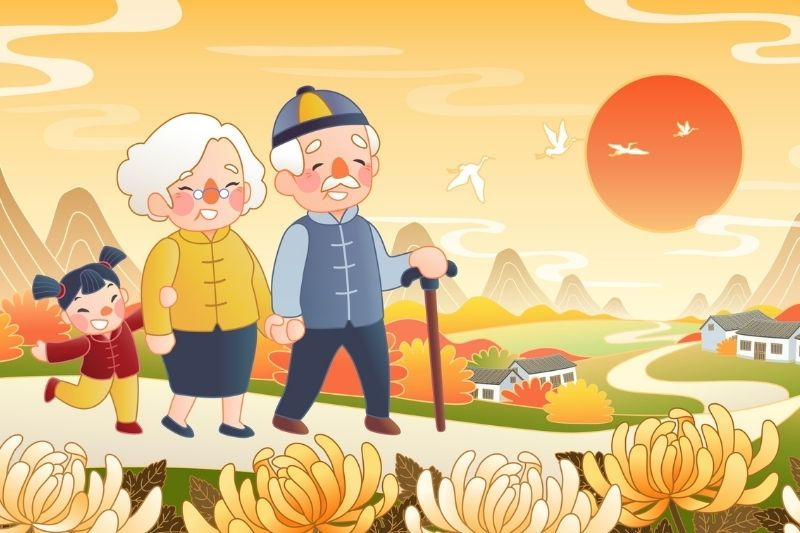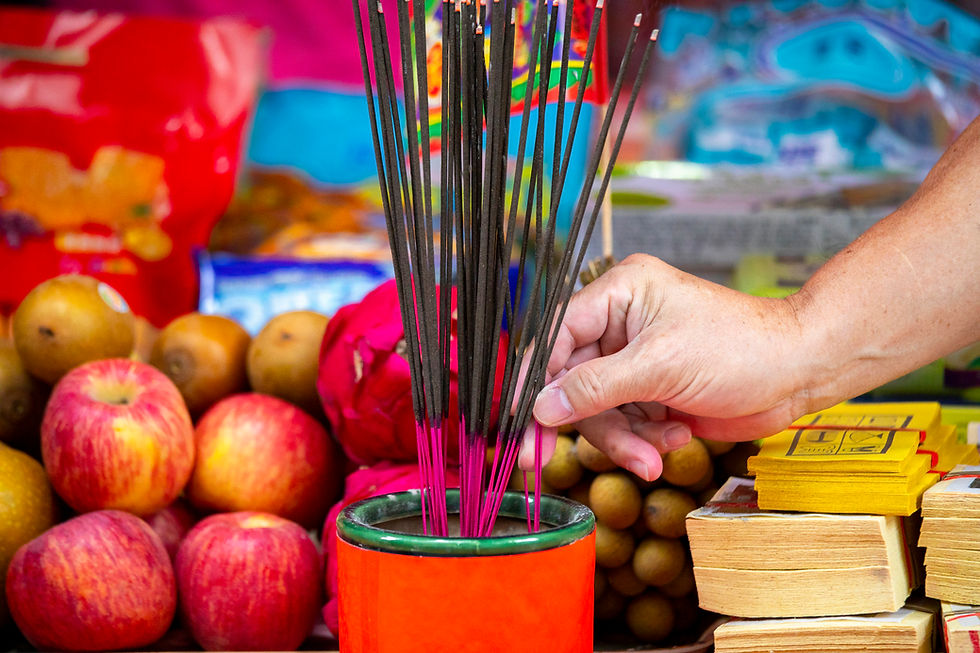What Is the Double Ninth Festival?
- Sep 18, 2025
- 6 min read
Each autumn we look forward to the Double Ninth Festival (Chongyang), observed on the ninth day of the ninth lunar month (29 October in 2025). This quiet festival falls as “clear and refreshing autumn arrives and chrysanthemums envelop the world”, signalling a time for outdoor health and family. In Chinese tradition the number nine is a yang number (associated with light and life), so the date 9/9 is doubly auspicious. For our family (originally from Guangzhou), these values and customs are part of who we are – we learned early that Chinese festivals are about family, love and well-being, not just food. Long before the takeaway kitchen was ours, we were taught that preparing a special dish or sharing tea was a way to show care for someone. In that spirit, the Double Ninth is a chance for us to remember our elders and seasonal flavours, carrying on the authentic traditions we’ve always done.
The Chongyang Festival has been called the “Old Man Festival” because it especially honours older people. In fact, since 1989 it has officially been Senior Citizens’ Day in China. Families use the occasion to pray for their elders’ health and longevity, often with outings or gatherings. We recall as children how our grandparents would insist on morning walks or morning tea on Chongyang – saying it kept us strong. Such outings are more than exercise: according to Chinese custom “old people especially [improve] their health by taking part in activities on the day of the festival”. So we too try to make time for the older generation, whether that means fitting in a visit, a phone call, or helping them taste a little chrysanthemum tea. In our takeaway business we honour this too – our commitment to quality and care comes from treating every customer like family, just as these traditions ask us to treat our elders with respect.
Climbing Mountains for Health and Good Fortune
A key Chongyang custom is to climb hills or mountains, symbolically rising above illness and misfortune. “People customarily climb mountains” on Double Ninth. In ancient China, climbing a high peak meant breathing fresh air and feeling strong against the coming winter. During Chongyang families would trek to a hilltop together – a way to exercise and also to “ward off disasters” by showing physical strength. Even now, many Chinese elders still keep this tradition. We remember our own grandparents bundling us up to hike at dawn, and we’ve seen older customers here quietly slip a dogwood (zhuyu) leaf into their pocket as they walk (zhuyu is meant to protect against evil spirits).
Living in Barry, we don’t have high mountains like China, but South Wales has plenty of lovely hills and coast paths. On Double Ninth, we often encourage friends and family to take a bracing walk – sometimes up to Wendover Woods or a local peak – and to enjoy the autumn views. The fresh air and gentle exercise bring the same blessings to health that our ancestors intended, and it’s a simple way to connect with the festival’s meaning.

Chrysanthemum: Autumn’s Flower of Longevity
Chrysanthemums are the star of Chongyang – the festival even has a Japanese name, the “Chrysanthemum Festival,” because the golden blooms come into season at this time. Our family’s home in Guangzhou always filled with chrysanthemum tea and snacks in late autumn, and we keep that custom today. Traditionally, people would sip chrysanthemum-infused wine or tea, believing the flowers kept them healthy and long-lived. In fact, chrysanthemum and the dogwood plant were both considered to have cleansing, medicinal qualities.
On Double Ninth, people often set out bouquets of chrysanthemums, and warm themselves with chrysanthemum liquor. (Today we usually prefer chrysanthemum tea – gentle and caffeine-free – and we may share a mug with our parents or elderly friends as a symbolic toast to their health.) The festival also brings chrysanthemum-flavoured foods: for example, bakeries sell special Chongyang cakes (also called flower cakes or chrysanthemum cakes) made in layers as a wish for longevity. These pastries are sometimes studded with petals or shaped in chrysanthemum patterns.
We might not bake a nine-layer cake, but we might try a recipe or order a flower cake to enjoy together. Even savory dishes sometimes get a chrysanthemum twist – like a soup or salad accented with edible petals. In all these ways, we taste the season’s harvest and symbolise the festival’s hope: that life keeps flowering and health endures.
Honouring Elders on Chongyang
On top of hills and at kitchen tables, Chongyang is really about cherishing our elders. It’s an opportunity to thank our older relatives for everything they’ve done for us. Many families visit grandparents or elderly neighbours, bring them small gifts, or simply give them extra attention on this day. Folk customs include writing a short poem or note for elders – a practice still meaningful to us. After all, as the traditions tell us, the festival is the “Old Men Festival” (sometimes translated as the Senior Day). The Chinese government even recognised that spirit by naming 9/9 as Senior Citizens’ Day.
We recall childhood Double Ninths when our parents would ask about our school or health, and we’d smile knowing they did that out of love. Now running our takeaway, we see other families do the same – older people popping in for a chat or a cup of tea. In a busy modern life, these gestures can slip by unnoticed, so Chongyang gives us all a reminder. We feel lucky that our business puts us in touch with a close-knit community; on Chongyang we’ll remember to pass along our respect and thanks, just as our grandparents taught us.
How We Observe Chongyang Today
Enjoy a cup of chrysanthemum tea and seasonal treats. For example, in our kitchen we’ll brew fresh chrysanthemum tea (using dried whole flowers) to sip throughout the day. This warm, soothing tea is our family’s way of bringing the flower’s “lasting fragrance” into the meal. Some customers like to share chrysanthemum-flavour cookies or jams at home, or even try making a simple chrysanthemum-flower cake, because “Flower cake” (Chongyang cake) is a traditional festival food. These foods are not on our menu, of course, but we encourage everyone to enjoy chrysanthemums in any edible form – for health and also to keep the flavour of the season alive.
Take a gentle hike or visit a high viewpoint. We treat any hill or trail as Chongyang sacred ground. Each year we try to gather at least once with family for a walk on the hills around Barry or Penarth, carrying thermos flasks of tea and snacks. Even a short climb to a local view can feel special – it’s like following in the footsteps of generations who believed fresh air brings good fortune. Some days we’ll take grandparents on a shorter stroll in a park instead; what matters is being together outdoors. In our experience, these simple outings – without rush or destination – are the most meaningful part of Chongyang.
Spend quality time with older relatives. Beyond food and hills, Chongyang is a time to show gratitude. Perhaps we’ll write a heartfelt note to our grandparents, or make a phone call just to listen. Some people in our town leave a small gift or a traditional red envelope to wish elders health, although we prefer thoughtful words over material things. In Chinese culture it’s common to say “chang shou bian feng” (长寿饼) – literally “longevity pastry” – to elderly people, along with good wishes. We find that the most important thing is simply expressing care: cooking our parents’ favourite home dish (even just at their table), or taking an extra moment to teach a grandchild a story. For many of us, giving a mum or dad a hug and saying “I love you” on Chongyang feels as meaningful as climbing a mountain – both are ways to say we value their well-being.
Chongyang Today in Our Community
Back in Guangzhou, Double Ninth might mean crowded parks or ancestor worship. Here in Barry it’s quieter but no less heartfelt. We see a bit of it in everyday life – a customer adding a “enjoy your tea” note to a takeaway order, or a weekend park path with an older couple arm in arm. Cultural groups in Britain hold small Chrysanthemum tea ceremonies or walks for seniors on this date, and last year we read that the Bristol China Bureau encouraged friends to purchase flower cakes from Chinese shops. Even without big public events, the meaning carries over: autumn leaves, the first cider, and the mild sunshine seem to ask us to slow down and reach out.
From our experience, it’s these little moments that carry Chongyang’s spirit: sharing a mug of warming tea on a crisp morning, looking out at a wide view on a hilltop, or listening to an elder’s story by candlelight. We know our customers treasure tradition too. So this Double Ninth Festival, we wish everyone good health and family closeness. Whether you’re enjoying a slow walk in our Welsh hills or serving chrysanthemum tea at home, may the day bring longevity and happiness to your loved ones.




